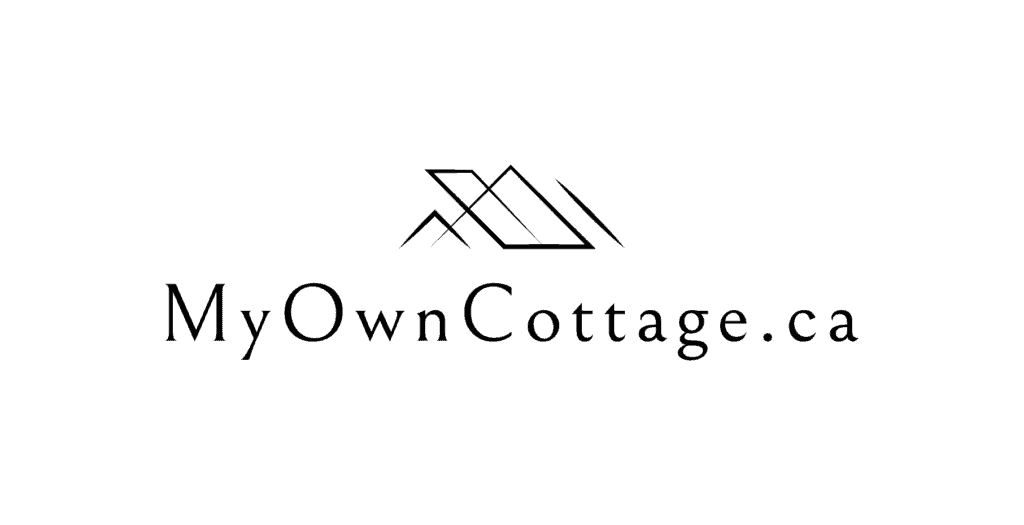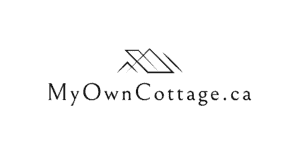Are Small Prefab Homes Eligible for Residential Mortgages in Ontario?
📅 Last updated: September 18th, 2025
✍️ Written by prefab building specialists at My Own Cottage
Are small prefab homes eligible for residential mortgages in Ontario? The short answer is yes — but only if they meet lender requirements such as CSA certification, a permanent foundation, and minimum square footage standards.
For smaller prefab units or tiny homes that don’t meet these criteria, buyers may need to explore alternative financing options. These can include credit unions, personal loans, or specialized lenders familiar with modular and tiny home financing.
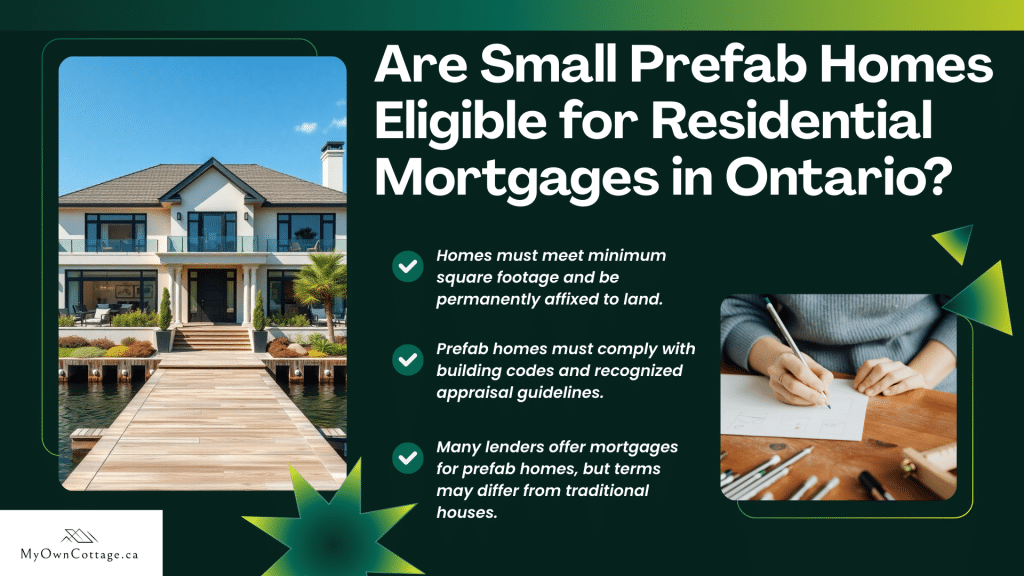
👉 Looking for current listings? Check out our guide to Small Prefab Homes Ontario for Sale and discover exciting options.
Understanding Prefab Homes & Mortgage Eligibility
It’s true that small prefab homes can qualify for a residential mortgage in Ontario, but only if they meet strict lender requirements. These typically include:
CSA A277 certification, proving the home meets national prefab standards
A permanent foundation, rather than a temporary or movable base
Minimum size requirements, often 700 sq. ft. or larger
Prefab homes that don’t meet these criteria may still be eligible for financing, but usually through alternative options such as credit unions, personal loans, or construction financing.
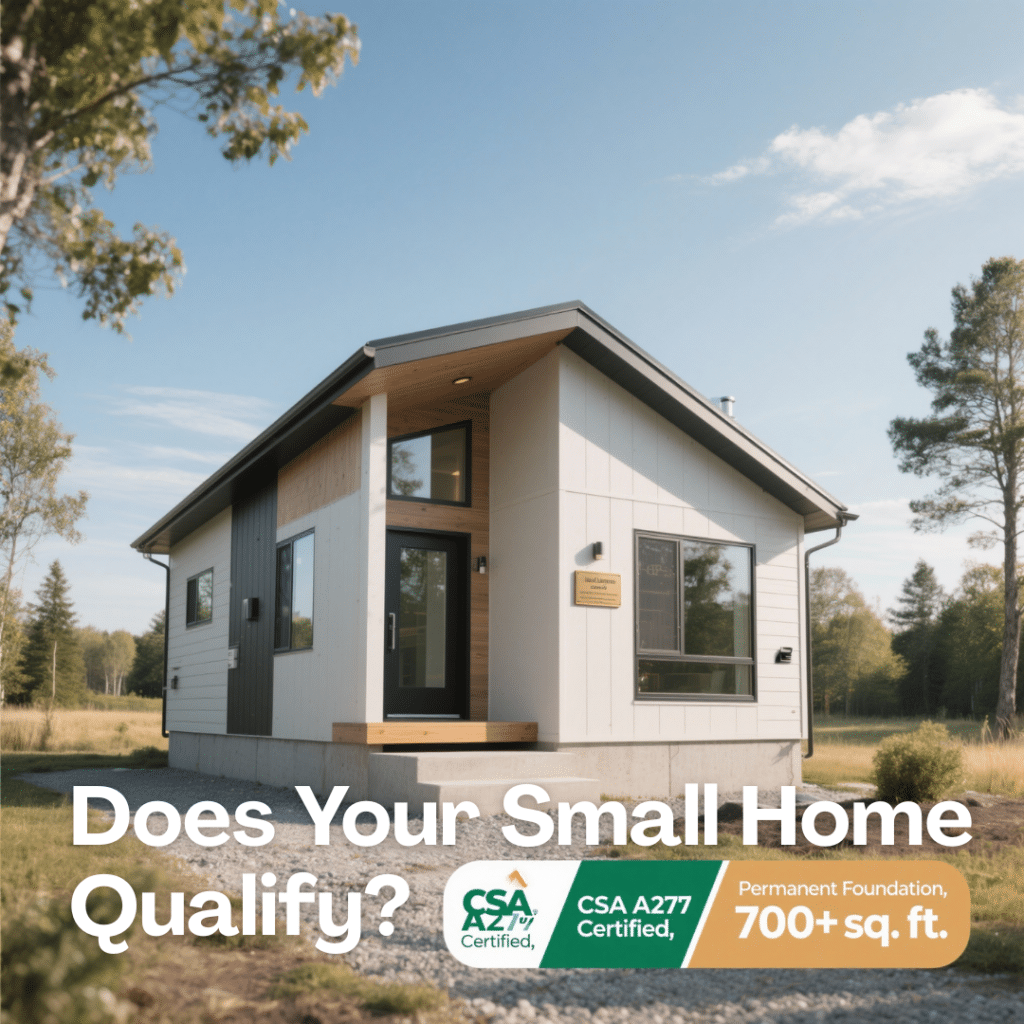
In this guide, we’ll cover mortgage eligibility rules, financing alternatives, and expert tips to help you make a well-informed decision before buying.
Before you decide on financing, it helps to understand what permits are required to build a small prefab home in Ontario, since zoning and legal compliance directly affect mortgage approval.
What Are Small Prefab Homes in Ontario?
Small prefab homes are becoming popular in Ontario.
These factory-built residential units are delivered in sections and assembled on-site. In Ontario, these homes are usually under 1,000 sq. ft., making them an attractive option for:
First-time homebuyers seeking an affordable entry into the housing market
Downsizers who want a low-maintenance, efficient living space
Eco-conscious buyers interested in sustainable building practices
💡 If sustainability is a priority, you may want to compare which Ontario companies offer eco-friendly small prefab homes before committing to a mortgage.
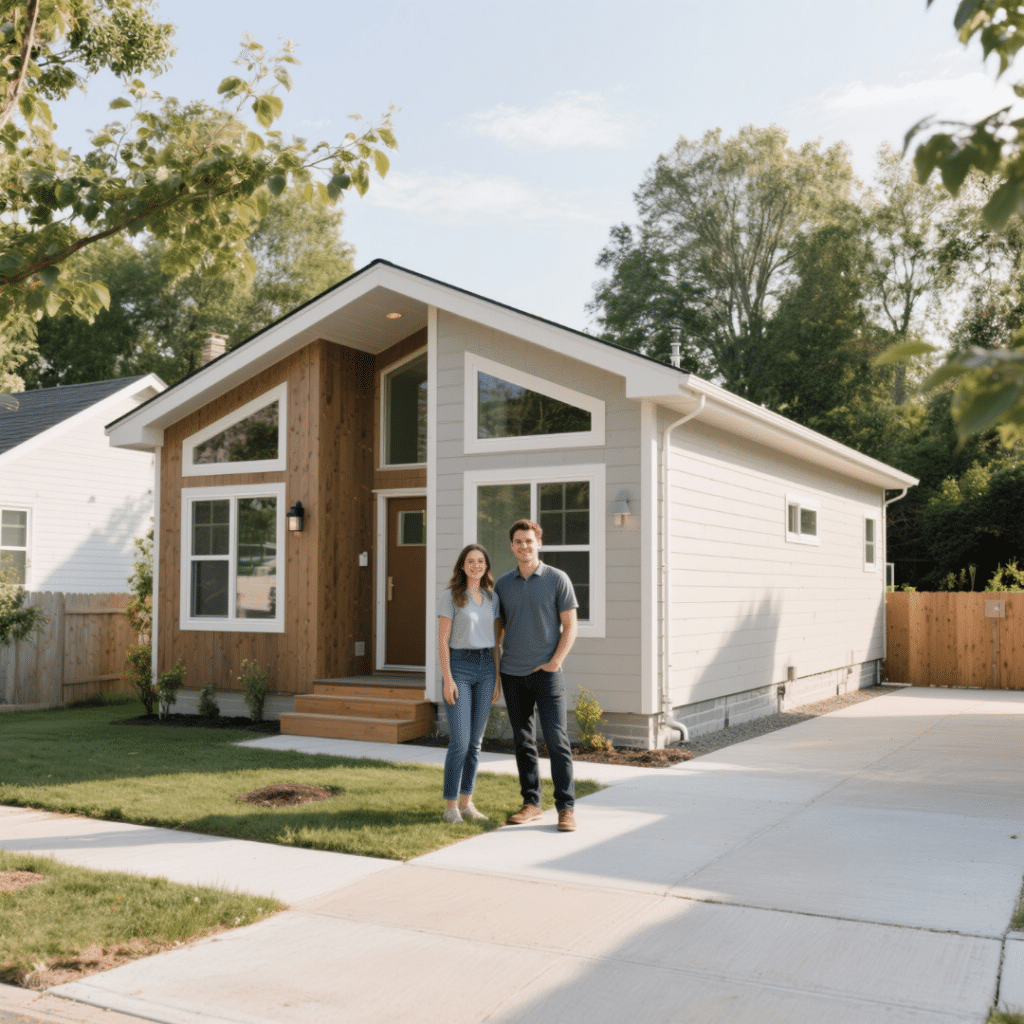
Key Benefits of Small Prefab Homes in Ontario
Faster construction: Built in a controlled factory setting, then assembled on-site in weeks instead of months
Lower costs: Typically more affordable than traditional stick-built homes
Customizable designs: Ranging from modern tiny homes to stylish cottages
Energy efficiency: Many models include advanced insulation, airtight construction, and renewable energy options
For buyers comparing long-term savings, it’s worth asking if small prefab homes are more energy-efficient than traditional houses in Ontario.
Also, remember that small prefab homes are often sold move-in ready or as kits in Ontario, which can influence your financing strategy.
🏡 Click below to browse stunning prefab home designs with pricing — and see what’s possible for your future build.
Mortgage Eligibility for Small Prefab Homes in Ontario: What Lenders Look For
Mortgage eligibility for prefab homes in Ontario depends on how lenders classify the property. Most banks and credit unions will only approve financing if the home:
Meets CSA A277 certification standards (Canadian Standards Association requirements for prefab construction)
Is placed on a permanent foundation, not a mobile or temporary base
Reaches the lender’s minimum size threshold, often 700 sq. ft. or larger
🔎 Example: Many major banks in Ontario will not issue a standard residential mortgage for prefab homes smaller than 700 sq. ft., which means tiny homes often fall outside conventional financing rules.

📝 Summary:
| Requirement | Description |
|---|---|
| CSA A277 Certification | Confirms the home meets Canadian prefab building standards |
| Permanent Foundation | Must be fixed (e.g., concrete slab or basement) |
| Minimum Square Footage | Most lenders require at least 700 sq. ft. |
✅ Key takeaway: Yes, small prefab homes can qualify for a mortgage in Ontario—but only if they meet lender-specific rules. Be sure to view our compliant designs to see what’s possible!
Ontario Lender Requirements: Policy Snapshot
Not all prefab homes are treated the same by mortgage lenders in Ontario. Eligibility often depends on three key factors: size, foundation type, and CSA certification.
To make comparisons easier, here’s a quick overview of how major Ontario lenders set their minimum requirements.
| Lender | Min. Square Footage | Foundation Type |
|---|---|---|
| RBC Royal Bank | 700 sq. ft. | Permanent (slab or basement) |
| TD Canada Trust | 720 sq. ft. | Permanent only |
| Meridian Credit Union | 600 sq. ft. | Permanent or screw piles |
| Scotiabank | 700 sq. ft. | Permanent |
| DUCA Credit Union | ≥600 sq. ft. preferred | Flexible (if on owned land) |
📌 Important: All lenders in Ontario require CSA A277 certification for prefab and modular homes. This certification confirms that the home was built to national building standards, ensuring quality, safety, and compliance with lender requirements.
📚 Sources:
👉 Need assistance? Get expert financing and budgeting advice for prefab homes in Ontario today.
Common Challenges When Financing Small Prefab Homes
While prefab homes are appealing, buyers often face obstacles when trying to secure mortgage approval, including:
Tiny home restrictions: Units under 700 sq. ft. typically fall below most banks’ minimum size requirements.
Land zoning issues: Some lots are not zoned for residential use, which prevents lenders from approving financing. Understanding zoning restrictions not only affects mortgages but also guides where you can buy small prefab homes in Ontario, since availability differs by municipality.
Non-traditional foundations: Homes on skids, posts, or movable bases are usually ineligible for a standard mortgage.
💡 Can I get a mortgage for a prefab home under 700 sq. ft.?
👉 Usually not through a traditional bank. Most lenders consider homes under 700 sq. ft. ineligible for standard residential mortgages. Buyers of micro-prefab or tiny homes often need to explore alternative financing, such as credit unions, personal loans, or construction financing.
💡 Do lenders treat prefab homes differently from modular homes?
👉 Yes. While both are factory-built, modular homes are generally built to local building codes, placed on permanent foundations, and therefore align more closely with mortgage requirements. In contrast, prefab homes without CSA A277 certification are more likely to be rejected by mainstream lenders.
🏘️ Since space limitations are often tied to land-use rules, you may also need to confirm whether a small prefab home can be put on any type of property in Ontario before applying for a mortgage.
How Prefab vs. Modular Affects Mortgage Approval
Although they’re often grouped together, prefab and modular homes are not viewed the same way by lenders.
Modular homes typically meet local building codes, are placed on permanent foundations, and therefore align more easily with mortgage requirements.
Prefab homes, on the other hand, may face stricter scrutiny — especially if they are under 700 sq. ft. or lack CSA A277 certification.
Financing Comparison: Modular vs. Prefab Homes in Ontario
| Type | Easier to Finance? | Why? |
|---|---|---|
| Modular Homes | ✅ Yes | Meet local building codes and have permanent foundations |
| Non-Certified Prefab | ❌ No | May lack CSA certification or a qualifying permanent foundation |
Alternatives to Traditional Mortgages for Small Prefab Homes
If your prefab home doesn’t qualify for a traditional mortgage, there are still several financing options to explore:
Personal loans – Best for smaller prefab builds, additions, or when borrowing amounts fall below mortgage minimums.
Construction mortgages – Funds are released in stages as the home is built, making this a common choice for new prefab projects.
Credit unions – Often more flexible than major banks, with some offering programs tailored to modular and prefab housing.
Government-backed programs – The CMHC (Canada Mortgage and Housing Corporation) may insure certain prefab mortgages, provided the property meets CSA standards and lender criteria.
Rent-to-own prefab homes in Ontario – An emerging option for affordability-focused buyers who want to build equity while renting.
Real Buyer Story: How One Couple Secured a Mortgage for Their Small Prefab Home
📍 Case Study: Sarah & Miguel – Peterborough, Ontario
“We never thought we’d qualify for a mortgage with such a small home, but with the right steps, we made it happen.”
🧩 The Challenge
Sarah and Miguel, a young couple from Peterborough, wanted a cost-effective, energy-efficient starter home. They fell in love with a 640 sq. ft. prefab bungalow listed by a local builder.
Their experience also highlights the importance of timing, since many buyers ask how long it takes to order and receive a small prefab home in Ontario once financing is approved.
Unfortunately, they faced major hurdles:
Too small for big banks: Both RBC and TD Canada Trust rejected their applications because the home was under the 700 sq. ft. minimum.
Foundation issues: The builder initially planned to place the unit on steel skids, which lenders didn’t accept.
Knowledge gap: The couple had no prior experience with CSA certification or prefab lending rules.
🔍 How They Solved It
Like many buyers wondering “Are small prefab homes eligible for residential mortgages in Ontario?”, this couple discovered that the answer depends on meeting lender requirements.
Working with My Own Cottage and a licensed mortgage broker, they followed a four-step strategy:
Upgraded the foundation – The couple opted for a permanent concrete slab, classifying the home as “real property” under lender rules.
Secured CSA A277 certification – This certification proved the home met Canada’s national prefab building standards.
Chose a flexible lender – They applied through Meridian Credit Union, one of the few lenders in Ontario that approves homes as small as 600 sq. ft.
Leveraged land ownership – Since they already owned a rural lot near Peterborough, their application was stronger and easier to approve.
💰 Financing Outcome
| Detail | Value |
|---|---|
| Home Size | 640 sq. ft. |
| Purchase Price | $225,000 |
| Down Payment | $35,000 |
| Lender | Meridian Credit Union |
| Loan Type | Construction-to-permanent mortgage |
| Interest Rate | 5.34% fixed (5-year) |
| Loan Term | 25 years |
🎉 Final Result
Sarah and Miguel moved into their prefab home just five months after signing their purchase agreement.
Their energy-efficient bungalow now costs them under $1,200 per month (including mortgage, insurance, and utilities) — a fraction of what many traditional homeowners pay.
“We’re homeowners without being house-poor. If you follow the right steps and stay flexible, prefab financing is possible — even under 700 square feet.”
— Sarah & Miguel, Ontario
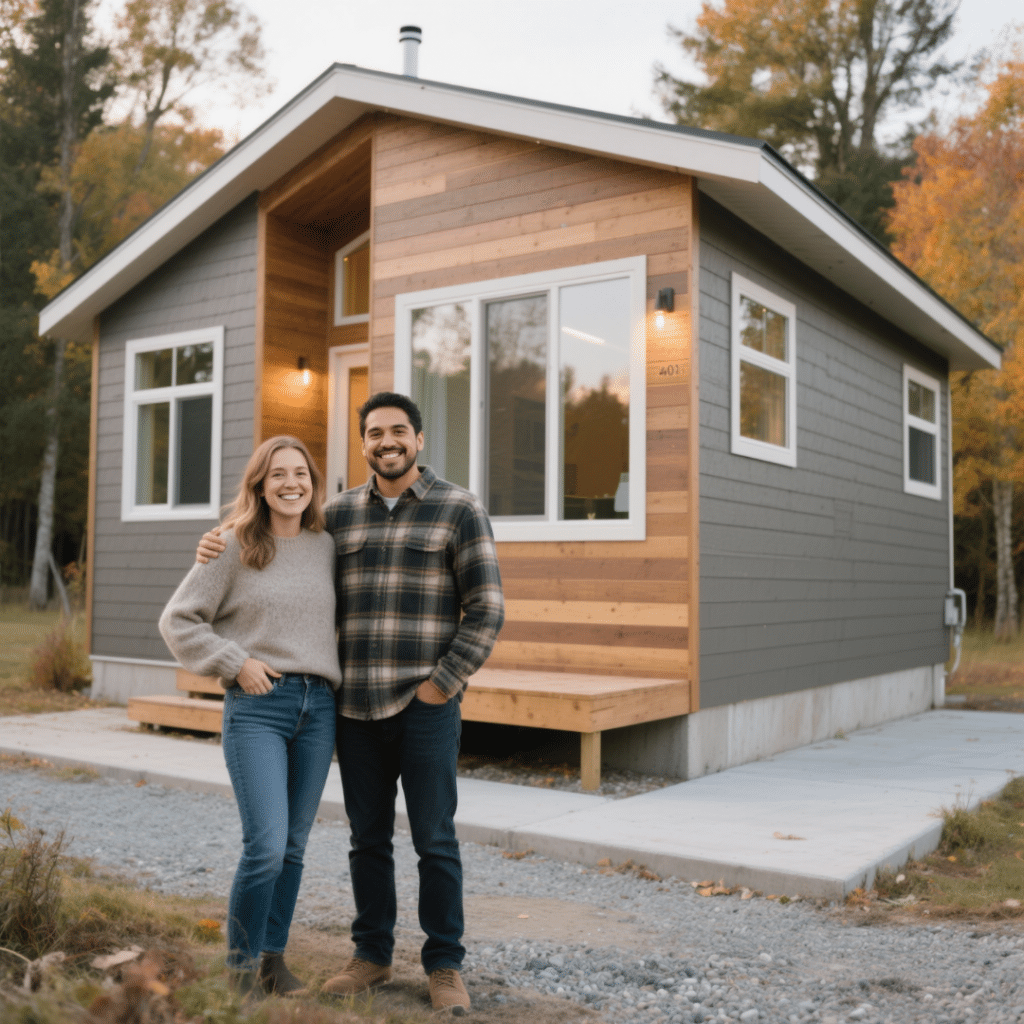
🛠️ Key Takeaways for Buyers
💡 Own land before applying – Having land in your name gives lenders more confidence and strengthens your mortgage application.
✅ Work only with CSA-certified builders – CSA A277 certification is mandatory for most lenders and ensures your prefab meets national building standards.
📐 Aim for 600 sq. ft. or larger – Homes under 600–700 sq. ft. are often rejected by banks, while larger units open up more financing options.
💬 Consult a mortgage broker – Not all lenders follow the same rules, and a broker can connect you with credit unions or alternative financing.
🧱 Invest in a permanent foundation – While more expensive upfront, it classifies your prefab as real property, making mortgage approval much easier.
Disclosure
This case study is based on a real client experience. Certain identifying details have been changed to protect privacy. Financing outcomes vary depending on lender policies, borrower qualifications, and property details.
🔗 Want a real cost list for easy reference? Discover small prefab homes in Ontario with prices today.
Mortgage Application Checklist for Small Prefab Homes in Ontario
Before applying, many buyers ask: “Are small prefab homes eligible for residential mortgages in Ontario?”
The answer comes down to documentation and compliance. To improve your chances, be prepared to provide:
CSA A277 certification – Proof that your home meets national prefab construction standards.
Land ownership or purchase agreement – Documentation showing you own the lot or have a signed purchase contract.
Permanent foundation details – Plans or contracts confirming the home will be placed on a permanent base.
Zoning compliance proof – Evidence that the land is zoned for residential use and allows prefab construction.
Builder contract & full cost breakdown – Itemized pricing that lenders use to assess loan value.
Mortgage pre-approval documents – A pre-approval letter showing how much financing you qualify for before building begins.
💰 Alongside financial paperwork, confirming if financing is available for small prefab homes in Ontario helps align expectations with lender requirements.
💬 Expert Q&A: Biggest Mortgage Hurdle for Prefab Home Buyers
Q: What’s the biggest hurdle for prefab home buyers trying to get a mortgage in Ontario?
A: “Most often, it’s the foundation and CSA certification. Many buyers don’t realize that without a permanent foundation and CSA A277 certification, traditional lenders won’t even consider the property. That’s where most applications fall apart.”
— Mark Gillespie, Mortgage Agent
🔑 Expert Tip from Mark
“If your prefab home is under 700 sq. ft., work with a mortgage broker early — they can help you access niche lenders or credit unions that are prefab-friendly.”
👉 Ready to explore? See available Small Prefab Homes Ontario for Sale to compare options and take your next step.
🌱 Final Thoughts: Financing Small Prefab Homes in Ontario
So, are small prefab homes eligible for residential mortgages in Ontario?
For most buyers, the answer is yes — provided the home meets lender rules around certification, foundation, and size.
For smaller or non-compliant units, alternative financing is still available, making prefab ownership achievable for many Ontarians.
🚀 Ready to Take the Next Step?
Looking to get financing assistance or start planning your build?
To get started today, simply book a free consultation, call us directly or view our design catalogue today.
🧑💼 Request a Free Consultation
📲 Call Us Directly: (705) 345-9337
🏘️ View Our Design Catalogue
✅ Ontario-Built | ⚡ Energy-Efficient | 🏡 Fully Customizable | 🚚 Fast Delivery
Alternatively, for your convenience, you can also simply fill out the contact form below and we’ll get back to you soon! 👇
FAQ: Are small prefab homes eligible for residential mortgages in Ontario?
Are small prefab homes eligible for a mortgage in Ontario?
Yes, small prefab homes can qualify for a residential mortgage in Ontario, but they must meet specific requirements. To be eligible, the home should:
Be built on a permanent foundation
Be legally classified as real property
Comply with CSA A277 certification and all local building codes
Be located on land that you own or are purchasing
Meeting these criteria helps lenders view the prefab home as a traditional residential property, making mortgage approval more likely.
What foundation is required for prefab home mortgage approval?
Most lenders in Ontario require a permanent foundation for prefab homes, such as a concrete slab, basement, or engineered footings. Foundations like blocks or skids are usually not accepted.
A permanent foundation is key because it allows the home to be classified as real property, which is essential for qualifying for a traditional mortgage.
Do you need to own the land to get a prefab home mortgage?
Yes, you generally need to own the land to qualify for a traditional residential mortgage in Ontario. If your prefab home is placed on leased land, most lenders will not consider it real property. In that case, you may need a chattel mortgage, which finances the structure as personal property rather than real estate.
What building codes and certifications apply to prefab homes in Ontario?
Prefab homes in Ontario must meet the CSA A277 certification standard and comply with the Ontario Building Code to qualify for most traditional financing. Homes that don’t meet these requirements are typically viewed as higher risk by lenders, making mortgage approval less likely.
Can you get CMHC insurance on a small prefab home?
Yes, prefab homes in Ontario may qualify for CMHC-insured mortgages, provided they meet standard lending requirements. To be eligible, the home should:
Be classified as real property
Carry CSA A277 certification
Sit on a permanent foundation
Be located on land you own or are purchasing
When these conditions are met, CMHC mortgage insurance can help lenders reduce risk and improve your chances of approval.
What if my prefab home is under 700 sq. ft.?
Prefab homes under 700 sq. ft. often face challenges qualifying for traditional mortgages with major banks in Ontario. Lenders may view smaller homes as higher risk or outside standard lending guidelines.
If your home is below this size threshold, you may need to consider alternative financing options, such as:
Credit unions
Chattel mortgages (personal property loans)
Personal loans or private lenders
Do lenders treat prefab homes differently from modular homes?
Yes, modular homes generally have an easier time qualifying for traditional mortgages in Ontario, particularly when they are CSA-certified and built on a permanent foundation. Lenders often view them as comparable to site-built homes.
By contrast, prefab or manufactured homes that lack certification or do not meet foundation standards may face stricter underwriting, limited lender options, or higher interest rates.
What financing options exist if I don’t qualify for a traditional mortgage?
If your prefab home does not qualify for a traditional mortgage in Ontario, there are several alternative financing options to consider:
Chattel mortgages – used when the home is treated as personal or movable property
Construction loans – ideal for covering costs during the building phase
Credit unions – often more flexible than major banks in approving unique properties
Government-backed programs – available if you meet specific eligibility requirements
These alternatives can provide financing solutions when traditional lenders are not an option.
How do I improve my chances of mortgage approval for a prefab home?
To improve your chances of getting mortgage approval for a prefab home in Ontario, make sure to:
Build on a permanent foundation (e.g., concrete slab or basement)
Work with a CSA-certified builder
Own the land where the home will be placed
Meet the minimum size and square footage requirements set by lenders
Confirm local zoning and permit compliance
Prepare and submit complete documentation upfront
Following these steps helps lenders view your prefab home as a stable, financeable property.
Does Tarion warranty coverage matter for prefab home financing?
Yes, in Ontario many lenders prefer or require that new homes — including prefab homes — be covered under a Tarion statutory warranty. This warranty protects buyers against construction defects and helps reassure lenders of the home’s quality.
If the home or its foundation is self-built or does not meet Tarion’s standards, obtaining warranty coverage can be difficult, which may limit your mortgage options.
Do any builders help with mortgages for small prefab homes in Ontario?
Yes, some prefab home builders in Ontario offer help with financing. For example, My Own Cottage partners with lenders to provide buyers of small prefab homes with access to mortgage and financing solutions that meet standard eligibility requirements.
Working with a builder who has established lender relationships can simplify the financing process and improve your chances of approval.
🛡️ Verified Third-Party Resources
For added confidence and transparency, here are trusted external sources that support modular homebuilding in Ontario:
Ontario Building Code (O. Reg. 332/12)
Official provincial regulations that govern modular and factory-built homes.Tarion Warranty Corporation
Provides home warranty coverage and builder licensing in Ontario.Canadian Home Builders’ Association (CHBA)
National organization supporting residential construction, modular certification, and best practices.CMHC – Canada Mortgage and Housing Corporation
Federal housing authority offering insights on modular housing affordability, financing, and energy efficiency.Statistics Canada: Housing Data
Data-driven research on Canadian housing trends, ownership, affordability, and construction.
